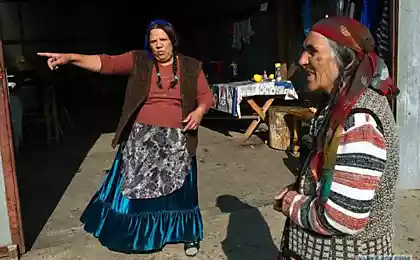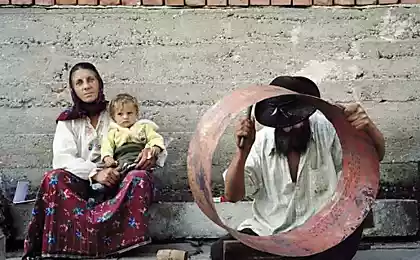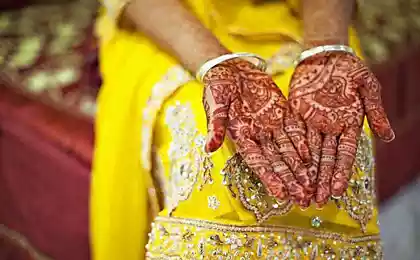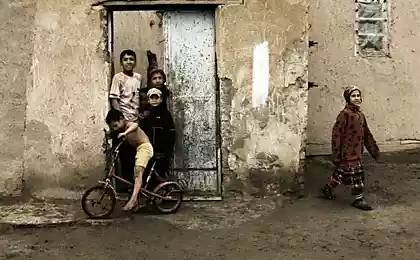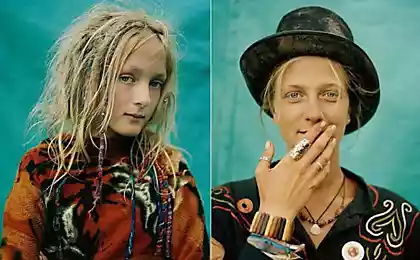1966
Gypsy wedding
Gypsy wedding - perhaps the most important and most respected family holiday. Each family finds it necessary to make a gorgeous ceremony and a terrific meal, regardless of their income. Surprisingly, many families are ruined even after spending on the wedding of their children
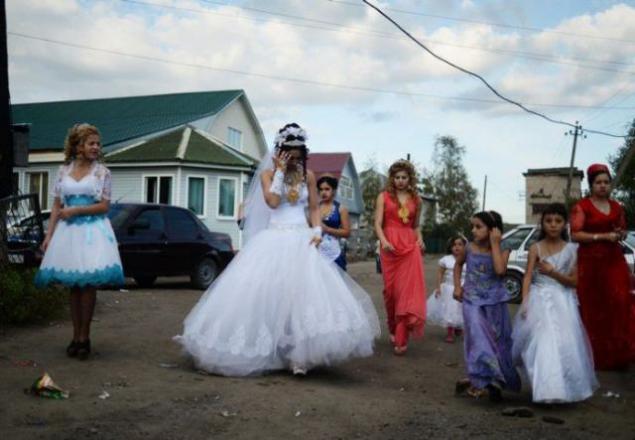
Bride on the Gypsy wedding in the camp in Chudovo.
Marriage with the help of matchmaking was most common among the Roma. Along with this, there are other. Gypsies could zasvatat their children when they were still infants. Parents agreed that upon reaching a certain age child will take the wedding. Such an agreement is strictly respected. Sometimes gypsies matchmaker girl 9-10 years old, and if her parents were in agreement, then took her to her and she lived with them until 13-15 years and then hosting a wedding. Such early marriages were necessary to keep the younger generation in the traditional way of life. Now, of course, is extremely rare to see the newlyweds 14-15 years. In recent years, the age of marriage varies between 16-20 years.
Women with the bride's attire.
The custom of exchanging brides (gypsy is called those keres ne skimbate) - when one family gave daughter-bride and groom took his sister in marriage for his son, was beneficial to both sides, and get rid of the family from having to repurchase.
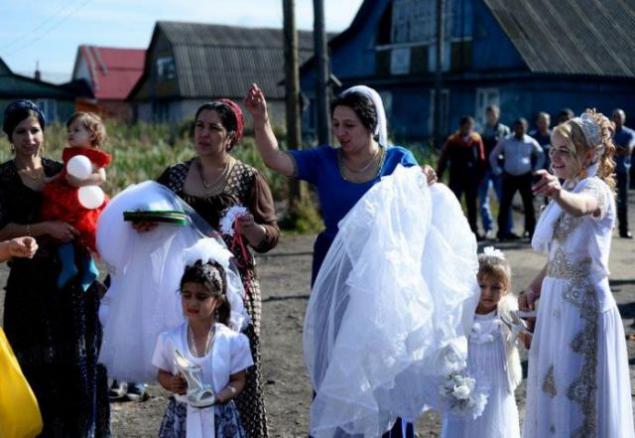
Groom
Courtship was held on strictly regulated ritual. In the home of the bride are the parents and relatives of the young man; two of them were called Swat. They who have been negotiating with the parents of the bride. The bride could not have known about the coming of the matchmakers, but when she learned about it in advance, you still never present at this as long as it is not called. If the parents, in the end, agree, called the bride and asked about her desire, knowing that her daughter will not go against the will of his father. The future father-girl hanging on his neck a gold coin in a sign that no one else has to woo her. In the case of children still nursing matchmaker, the boy's father also gave the girl a gold coin that she was wearing it when older.

Serving tables on the Gypsy wedding in the camp.
Gypsies was extended this form of marriage, the bride as theft. This was due primarily to economic reasons - there was no money for a wedding, or for the payment of ransom. But more often resorted to kidnapping, if the parents did not allow boys and girls to marry.
Generally, kidnapping by mutual agreement or violent, not fictitious abduction, provided customs Roma, but they are not a dominant form of imprisonment. In addition, the Roma themselves do not welcome. The outcome of these shoots happen in two ways: either young so arrange the escape that they will not catch up (then after a while they returned to the encampment, where they were received as a husband and wife). If the boys and girls had time to catch up, the denouement could be the most tragic.

Bride on the Gypsy wedding in the camp.
Marriages can be between people of different ethnic groups, although most approved marriages within their group (if only betrothed were not relatives).

The bride prepares for wedding
When choosing a bride Roma guided by its origin (ie, wealth and reputation of her parents), as well as her beauty and professional qualities.
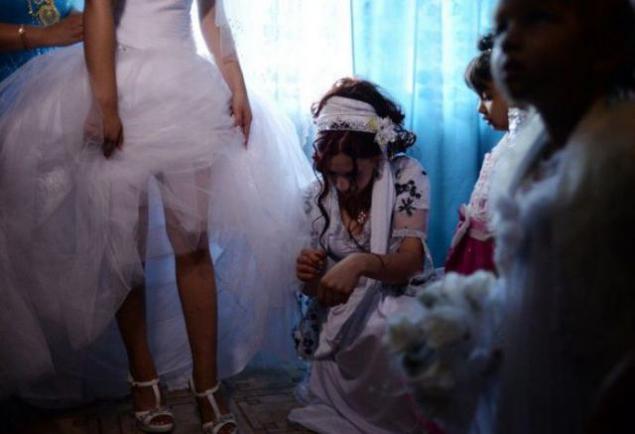
If a ransom is paid for the bride - it is done before the wedding - during or after the ritual of courtship. Redemption (at Kelderari - Ando VAST - literally "hand") - is a sign of respect and the family of the groom, father of the bride and the compensation for the fact that he is deprived of the potential dobytchitsy. Dimensions foreclosure determined during matchmaking father of the bride, guided degree of prosperity of the family of the groom.

This custom aggravated servile position of women in the new family. My husband's parents, paying gold for the daughter, considered themselves its rightful owners. Apparently, therefore, there was a custom of the return of redemption as a gift to young (jam). This happened on the second day of the wedding, when the guests are given gifts to the young. Thus, the parents tried to make life easier for her daughter.
Wedding expenses often taking on the relatives of the groom; sometimes, by agreement, shared half the parents of the bride. On giving the gypsies when wooing a girl was not mentioned, however, it is required to come on - it was a feather bed, pillows, clothing and jewelry. But now it is not equivalent to the bed or things, and the keys to the house, where they will live young (if the bride's parents are able to provide it), car keys or gold jewelry.
At the wedding guests are given as gifts to young valuables or money. "Mandar Hantz Affairs of Qatar in May Booth" - "From me a little more of God" - sentenced Roma, presenting gifts to the young. Sometimes the collected gifts pay back the wedding expenses.
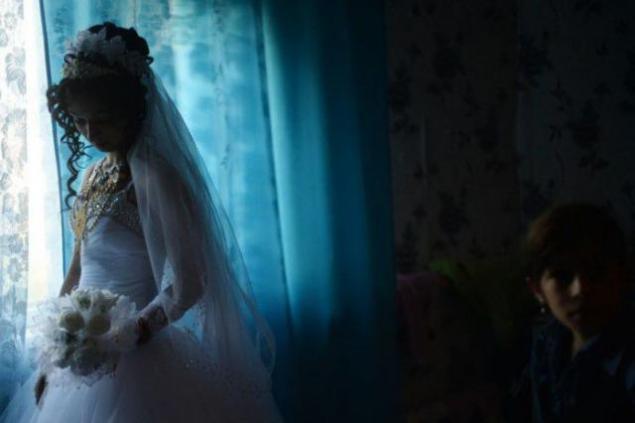
Weddings at Roma were held at any time of year, but more often in the summer. The appointed day wedding invites and gathered at the selected location several families of Gypsies.
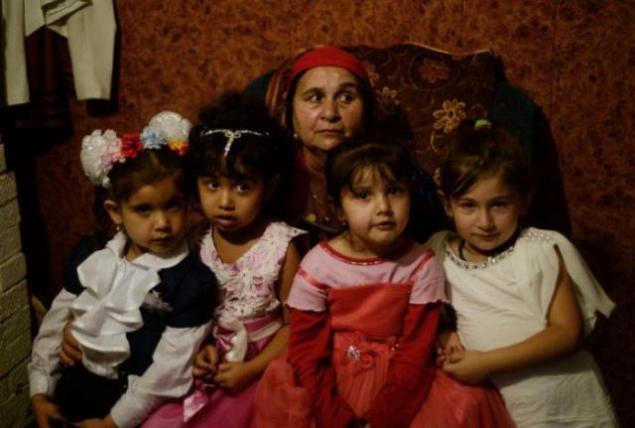
Gypsy wedding begins in the house of the bride. Here the musicians play, and the girl, wearing wedding dress, dance down to the guests.
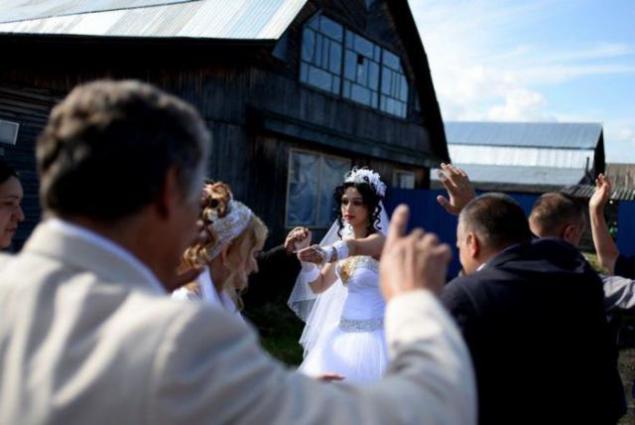
After that, someone brings their guests the bride groom's house, where the wedding table already laid for the young. Guest covered individual tables - separate for men and women. At the wedding may be several hundred people.
Further young escorted into the bedroom, which sometimes could stay old woman. This occurred in the midst of the wedding feast. The culmination of the wedding was a young takeaway shirt on a tray decorated with red flowers. The guests drank to the bride's parents and thanked for bringing up her daughter, than those very proud. All guests were handed paper flowers or ribbons of red, which pinned on clothing and hair; red - a symbol of the wedding. If the bride was without blemish, guests are given the gifts of the young. If not (which was very rare), her parents recover all the wedding expenses.

Once returned to the young guests of the bedroom, the girl wears a dress of married women: a headscarf, skirt apron. Some Gypsies and change the hairstyle of the bride, braiding hair in braids.
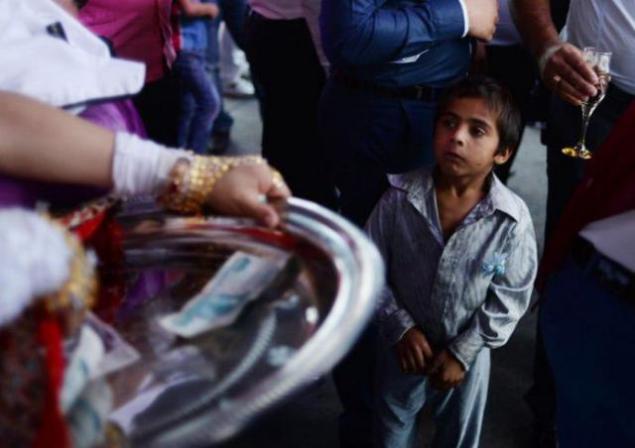
Usually wedding lasted two to three days; rich Roma walked week. After the wedding, the wife always went to live with her husband.

Nowadays it is very often the case that Roma are recorded in the marriage registry office only when necessary. If registration occurs, then, as a rule, it is not woven into the fabric of a traditional wedding. It may be a month before the wedding, or a week after. Registration of marriage before the wedding does not mean that the bride and groom actually became husband and wife.
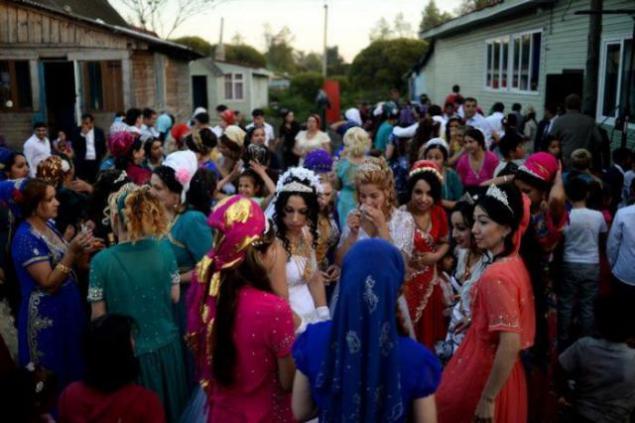
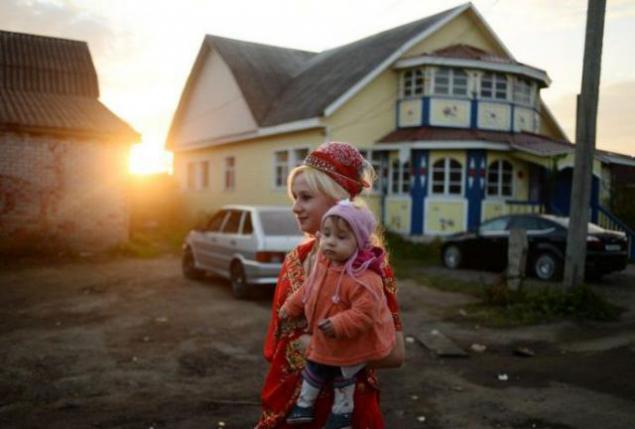
Gypsy weddings are characterized by the lack of any tradition of divorce. As a rule, the Roma is a rare phenomenon. If a woman is not satisfied, it can just get away from the men, but no special customs for that Roma are not provided.

Nowadays there are more divorces. As before, when the courtship of the dowry not say - although it must give. But on the second day of the wedding, when presented with the gifts of the young, the parents of the bride give posago.

It is done publicly to all those present at the wedding is seen in the case of divorce the woman could get my things - because if the marriage is not legally issued, it is often injured in his interests in divorce.
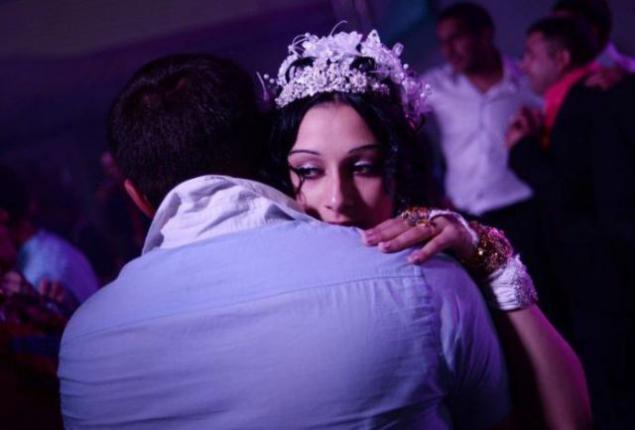
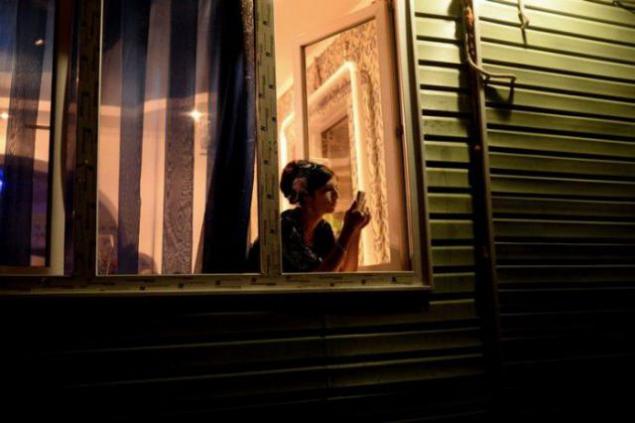

Hence

Bride on the Gypsy wedding in the camp in Chudovo.
Marriage with the help of matchmaking was most common among the Roma. Along with this, there are other. Gypsies could zasvatat their children when they were still infants. Parents agreed that upon reaching a certain age child will take the wedding. Such an agreement is strictly respected. Sometimes gypsies matchmaker girl 9-10 years old, and if her parents were in agreement, then took her to her and she lived with them until 13-15 years and then hosting a wedding. Such early marriages were necessary to keep the younger generation in the traditional way of life. Now, of course, is extremely rare to see the newlyweds 14-15 years. In recent years, the age of marriage varies between 16-20 years.
Women with the bride's attire.
The custom of exchanging brides (gypsy is called those keres ne skimbate) - when one family gave daughter-bride and groom took his sister in marriage for his son, was beneficial to both sides, and get rid of the family from having to repurchase.

Groom
Courtship was held on strictly regulated ritual. In the home of the bride are the parents and relatives of the young man; two of them were called Swat. They who have been negotiating with the parents of the bride. The bride could not have known about the coming of the matchmakers, but when she learned about it in advance, you still never present at this as long as it is not called. If the parents, in the end, agree, called the bride and asked about her desire, knowing that her daughter will not go against the will of his father. The future father-girl hanging on his neck a gold coin in a sign that no one else has to woo her. In the case of children still nursing matchmaker, the boy's father also gave the girl a gold coin that she was wearing it when older.

Serving tables on the Gypsy wedding in the camp.
Gypsies was extended this form of marriage, the bride as theft. This was due primarily to economic reasons - there was no money for a wedding, or for the payment of ransom. But more often resorted to kidnapping, if the parents did not allow boys and girls to marry.
Generally, kidnapping by mutual agreement or violent, not fictitious abduction, provided customs Roma, but they are not a dominant form of imprisonment. In addition, the Roma themselves do not welcome. The outcome of these shoots happen in two ways: either young so arrange the escape that they will not catch up (then after a while they returned to the encampment, where they were received as a husband and wife). If the boys and girls had time to catch up, the denouement could be the most tragic.

Bride on the Gypsy wedding in the camp.
Marriages can be between people of different ethnic groups, although most approved marriages within their group (if only betrothed were not relatives).

The bride prepares for wedding
When choosing a bride Roma guided by its origin (ie, wealth and reputation of her parents), as well as her beauty and professional qualities.

If a ransom is paid for the bride - it is done before the wedding - during or after the ritual of courtship. Redemption (at Kelderari - Ando VAST - literally "hand") - is a sign of respect and the family of the groom, father of the bride and the compensation for the fact that he is deprived of the potential dobytchitsy. Dimensions foreclosure determined during matchmaking father of the bride, guided degree of prosperity of the family of the groom.

This custom aggravated servile position of women in the new family. My husband's parents, paying gold for the daughter, considered themselves its rightful owners. Apparently, therefore, there was a custom of the return of redemption as a gift to young (jam). This happened on the second day of the wedding, when the guests are given gifts to the young. Thus, the parents tried to make life easier for her daughter.
Wedding expenses often taking on the relatives of the groom; sometimes, by agreement, shared half the parents of the bride. On giving the gypsies when wooing a girl was not mentioned, however, it is required to come on - it was a feather bed, pillows, clothing and jewelry. But now it is not equivalent to the bed or things, and the keys to the house, where they will live young (if the bride's parents are able to provide it), car keys or gold jewelry.
At the wedding guests are given as gifts to young valuables or money. "Mandar Hantz Affairs of Qatar in May Booth" - "From me a little more of God" - sentenced Roma, presenting gifts to the young. Sometimes the collected gifts pay back the wedding expenses.

Weddings at Roma were held at any time of year, but more often in the summer. The appointed day wedding invites and gathered at the selected location several families of Gypsies.

Gypsy wedding begins in the house of the bride. Here the musicians play, and the girl, wearing wedding dress, dance down to the guests.

After that, someone brings their guests the bride groom's house, where the wedding table already laid for the young. Guest covered individual tables - separate for men and women. At the wedding may be several hundred people.
Further young escorted into the bedroom, which sometimes could stay old woman. This occurred in the midst of the wedding feast. The culmination of the wedding was a young takeaway shirt on a tray decorated with red flowers. The guests drank to the bride's parents and thanked for bringing up her daughter, than those very proud. All guests were handed paper flowers or ribbons of red, which pinned on clothing and hair; red - a symbol of the wedding. If the bride was without blemish, guests are given the gifts of the young. If not (which was very rare), her parents recover all the wedding expenses.

Once returned to the young guests of the bedroom, the girl wears a dress of married women: a headscarf, skirt apron. Some Gypsies and change the hairstyle of the bride, braiding hair in braids.

Usually wedding lasted two to three days; rich Roma walked week. After the wedding, the wife always went to live with her husband.

Nowadays it is very often the case that Roma are recorded in the marriage registry office only when necessary. If registration occurs, then, as a rule, it is not woven into the fabric of a traditional wedding. It may be a month before the wedding, or a week after. Registration of marriage before the wedding does not mean that the bride and groom actually became husband and wife.


Gypsy weddings are characterized by the lack of any tradition of divorce. As a rule, the Roma is a rare phenomenon. If a woman is not satisfied, it can just get away from the men, but no special customs for that Roma are not provided.

Nowadays there are more divorces. As before, when the courtship of the dowry not say - although it must give. But on the second day of the wedding, when presented with the gifts of the young, the parents of the bride give posago.

It is done publicly to all those present at the wedding is seen in the case of divorce the woman could get my things - because if the marriage is not legally issued, it is often injured in his interests in divorce.



Hence

